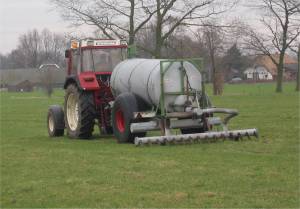Making the Nitrate Problem of Agriculture Vanish into Air
Nitrate concentrations of our groundwater are among the highest in the European Union. The main reason is overfertilization of fields with feces from livestock farming. Every year, a “liquid manure shower” of 200 million tons goes down onto German fields, the result being too high nitrate levels at one third of the groundwater quality measurement points. Researchers of Karlsruhe Institute of Technology (KIT), together with the Foundation for the Environment of Rhineland-Palatinate and an environmental engineering office, are working on a very simple process for the large-scale cleaning of polluted drainage water from agricultural areas.
By early 2015 at the latest, German groundwater would have had to be in a “good state” according to EU directives, with nitrate concentrations lower than 50 mg per liter. According to the recent nitrate report issued by the Federal Government every four years, however, fertilizers used in agriculture still continue to adversely affect water quality in Germany, and there are hardly any signs of improvement. The situation is even worse in the few remaining moors that play an important role for the natural water budget and the binding of hazardous greenhouse gases: “Most of the bog is damaged,” Victoria Grießmeier of KIT’s Institute for Applied Biosciences (IAB) says.
Full Text: Press Release 034/2018
mex, 29.03.2018

